CST Principles: Dignity, Common Good, and Solidarity Explained
VerifiedAdded on 2022/12/12
|6
|1525
|332
Essay
AI Summary
This essay provides a comprehensive overview of Catholic Social Thought (CST) and its core principles, including the dignity of the human person, the common good, subsidiarity, solidarity, and the preferential option for the poor. It defines and describes each principle, emphasizing their interconnectedness and application within the context of Australian society. The essay explores how these principles guide interactions between the self and the community, highlighting the importance of justice, peace, and human flourishing. The relationship between the self and the community is examined through the lens of CST, showing how these principles can create a harmonious and just society. The essay concludes by emphasizing the importance of CST principles in promoting individual happiness and community prosperity.
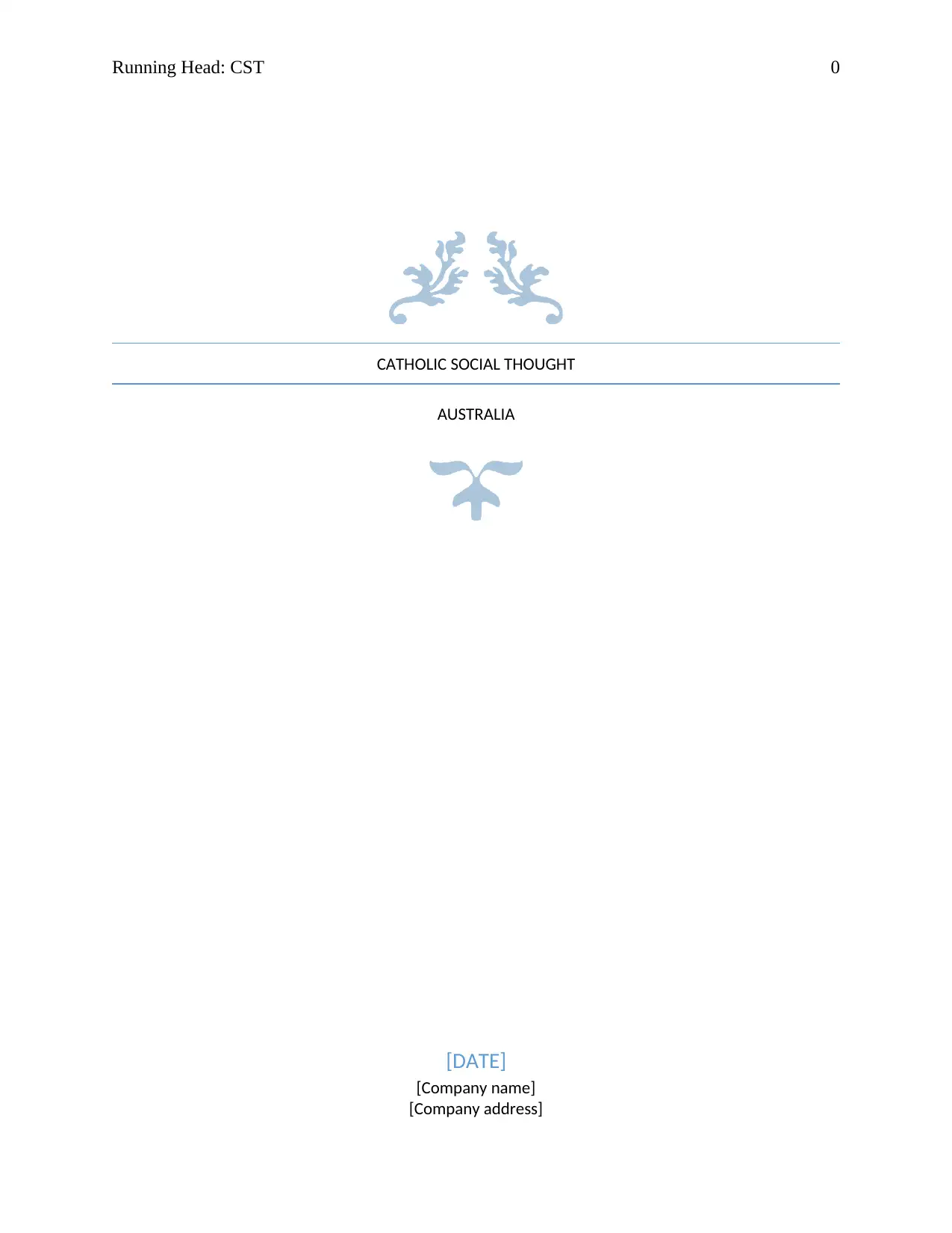
Running Head: CST 0
CATHOLIC SOCIAL THOUGHT
AUSTRALIA
[DATE]
[Company name]
[Company address]
CATHOLIC SOCIAL THOUGHT
AUSTRALIA
[DATE]
[Company name]
[Company address]
Paraphrase This Document
Need a fresh take? Get an instant paraphrase of this document with our AI Paraphraser

CST 1
Introduction
Throughout this article, all the basic principles of Catholic Social Thought will be stated, defined
and described and further the relationships between these principles will be related and examined
with the help of understanding the meaning of self and community. These principles are drawn
out from various documents, Bishop's statements and the conferences which helped up for a
century. These principles reflect the Christian tradition i.e. the ways of living and working of the
Christian men and women and also the continuous developments in them.
Constitution of good life and application of the
golden rule
There are several challenges faced by all human beings in this western society and inequalities
are caused due to the imposition of individualism, consumerism, and materialism. So the
question in this case raises is what are how an individual can attain or fulfill their potentials and
opportunities? What did they want from the self and the community? Etc. Here come the needs
of the golden rule which can also be called as "ethic of reciprocity" which can be found and
imposed easily over any society, culture, religion and the secular philosophies. These golden
rules have that power that can very efficiently and ethically help in building a peaceful and
sustainable society (University, Human folurishing ).
In Australia Catholic, social thought plays the role of these golden rules which is being taught in
the Christian community. CST is considered as those principles which are used to promote
human flourishing. It was developed through the biblical through the Christian tradition. The
basic 5 principles of the CST are as follows:
Introduction
Throughout this article, all the basic principles of Catholic Social Thought will be stated, defined
and described and further the relationships between these principles will be related and examined
with the help of understanding the meaning of self and community. These principles are drawn
out from various documents, Bishop's statements and the conferences which helped up for a
century. These principles reflect the Christian tradition i.e. the ways of living and working of the
Christian men and women and also the continuous developments in them.
Constitution of good life and application of the
golden rule
There are several challenges faced by all human beings in this western society and inequalities
are caused due to the imposition of individualism, consumerism, and materialism. So the
question in this case raises is what are how an individual can attain or fulfill their potentials and
opportunities? What did they want from the self and the community? Etc. Here come the needs
of the golden rule which can also be called as "ethic of reciprocity" which can be found and
imposed easily over any society, culture, religion and the secular philosophies. These golden
rules have that power that can very efficiently and ethically help in building a peaceful and
sustainable society (University, Human folurishing ).
In Australia Catholic, social thought plays the role of these golden rules which is being taught in
the Christian community. CST is considered as those principles which are used to promote
human flourishing. It was developed through the biblical through the Christian tradition. The
basic 5 principles of the CST are as follows:
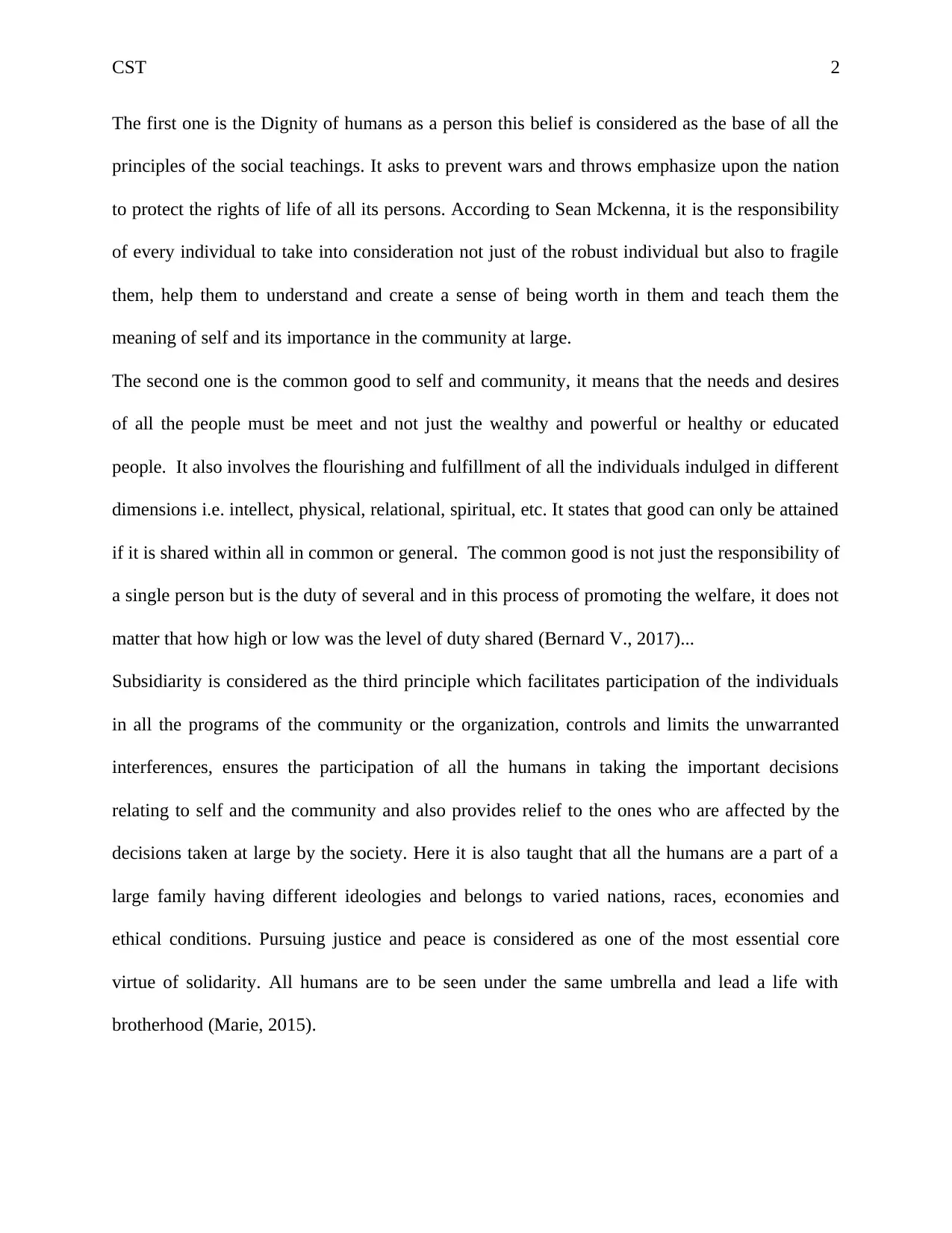
CST 2
The first one is the Dignity of humans as a person this belief is considered as the base of all the
principles of the social teachings. It asks to prevent wars and throws emphasize upon the nation
to protect the rights of life of all its persons. According to Sean Mckenna, it is the responsibility
of every individual to take into consideration not just of the robust individual but also to fragile
them, help them to understand and create a sense of being worth in them and teach them the
meaning of self and its importance in the community at large.
The second one is the common good to self and community, it means that the needs and desires
of all the people must be meet and not just the wealthy and powerful or healthy or educated
people. It also involves the flourishing and fulfillment of all the individuals indulged in different
dimensions i.e. intellect, physical, relational, spiritual, etc. It states that good can only be attained
if it is shared within all in common or general. The common good is not just the responsibility of
a single person but is the duty of several and in this process of promoting the welfare, it does not
matter that how high or low was the level of duty shared (Bernard V., 2017)...
Subsidiarity is considered as the third principle which facilitates participation of the individuals
in all the programs of the community or the organization, controls and limits the unwarranted
interferences, ensures the participation of all the humans in taking the important decisions
relating to self and the community and also provides relief to the ones who are affected by the
decisions taken at large by the society. Here it is also taught that all the humans are a part of a
large family having different ideologies and belongs to varied nations, races, economies and
ethical conditions. Pursuing justice and peace is considered as one of the most essential core
virtue of solidarity. All humans are to be seen under the same umbrella and lead a life with
brotherhood (Marie, 2015).
The first one is the Dignity of humans as a person this belief is considered as the base of all the
principles of the social teachings. It asks to prevent wars and throws emphasize upon the nation
to protect the rights of life of all its persons. According to Sean Mckenna, it is the responsibility
of every individual to take into consideration not just of the robust individual but also to fragile
them, help them to understand and create a sense of being worth in them and teach them the
meaning of self and its importance in the community at large.
The second one is the common good to self and community, it means that the needs and desires
of all the people must be meet and not just the wealthy and powerful or healthy or educated
people. It also involves the flourishing and fulfillment of all the individuals indulged in different
dimensions i.e. intellect, physical, relational, spiritual, etc. It states that good can only be attained
if it is shared within all in common or general. The common good is not just the responsibility of
a single person but is the duty of several and in this process of promoting the welfare, it does not
matter that how high or low was the level of duty shared (Bernard V., 2017)...
Subsidiarity is considered as the third principle which facilitates participation of the individuals
in all the programs of the community or the organization, controls and limits the unwarranted
interferences, ensures the participation of all the humans in taking the important decisions
relating to self and the community and also provides relief to the ones who are affected by the
decisions taken at large by the society. Here it is also taught that all the humans are a part of a
large family having different ideologies and belongs to varied nations, races, economies and
ethical conditions. Pursuing justice and peace is considered as one of the most essential core
virtue of solidarity. All humans are to be seen under the same umbrella and lead a life with
brotherhood (Marie, 2015).
⊘ This is a preview!⊘
Do you want full access?
Subscribe today to unlock all pages.

Trusted by 1+ million students worldwide
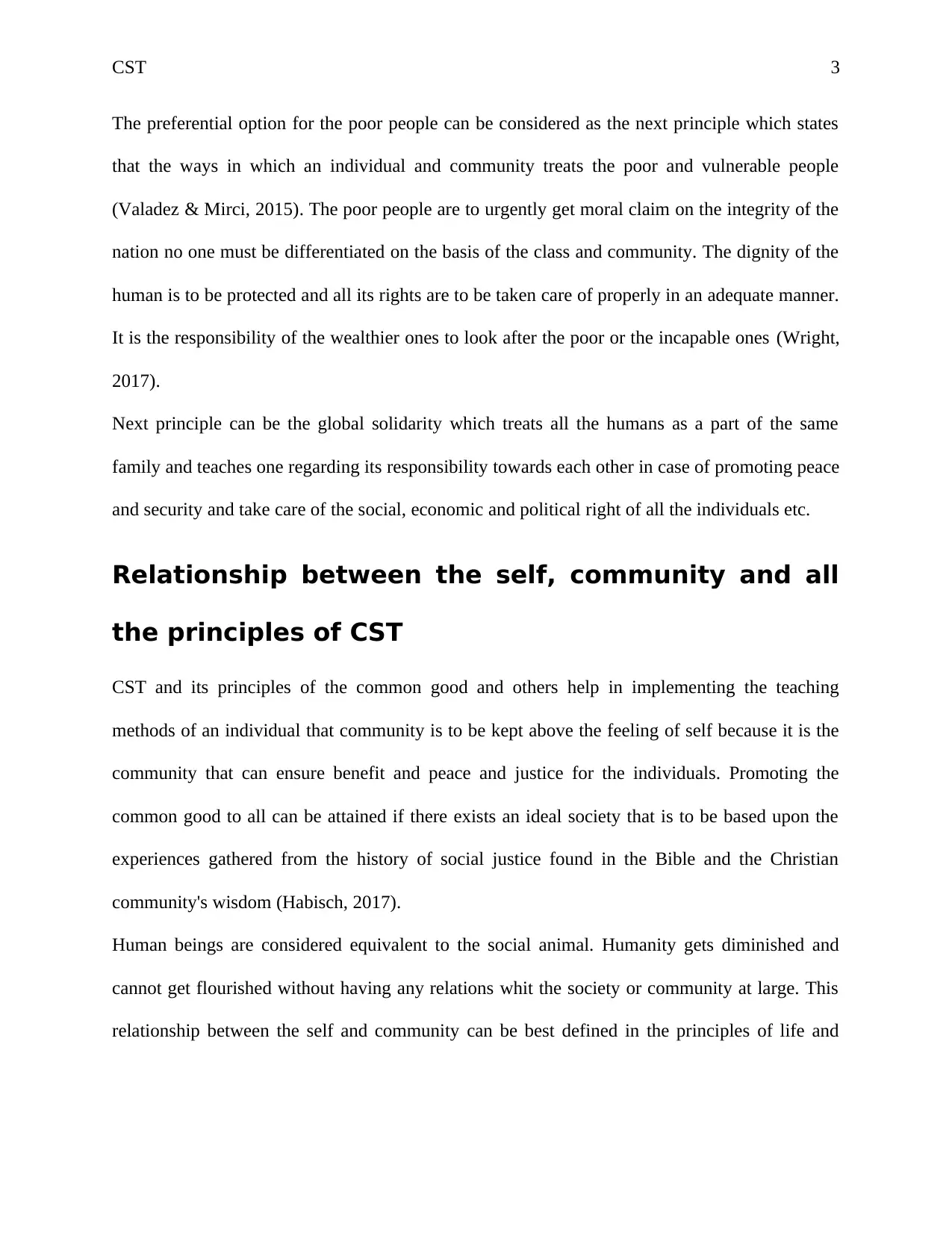
CST 3
The preferential option for the poor people can be considered as the next principle which states
that the ways in which an individual and community treats the poor and vulnerable people
(Valadez & Mirci, 2015). The poor people are to urgently get moral claim on the integrity of the
nation no one must be differentiated on the basis of the class and community. The dignity of the
human is to be protected and all its rights are to be taken care of properly in an adequate manner.
It is the responsibility of the wealthier ones to look after the poor or the incapable ones (Wright,
2017).
Next principle can be the global solidarity which treats all the humans as a part of the same
family and teaches one regarding its responsibility towards each other in case of promoting peace
and security and take care of the social, economic and political right of all the individuals etc.
Relationship between the self, community and all
the principles of CST
CST and its principles of the common good and others help in implementing the teaching
methods of an individual that community is to be kept above the feeling of self because it is the
community that can ensure benefit and peace and justice for the individuals. Promoting the
common good to all can be attained if there exists an ideal society that is to be based upon the
experiences gathered from the history of social justice found in the Bible and the Christian
community's wisdom (Habisch, 2017).
Human beings are considered equivalent to the social animal. Humanity gets diminished and
cannot get flourished without having any relations whit the society or community at large. This
relationship between the self and community can be best defined in the principles of life and
The preferential option for the poor people can be considered as the next principle which states
that the ways in which an individual and community treats the poor and vulnerable people
(Valadez & Mirci, 2015). The poor people are to urgently get moral claim on the integrity of the
nation no one must be differentiated on the basis of the class and community. The dignity of the
human is to be protected and all its rights are to be taken care of properly in an adequate manner.
It is the responsibility of the wealthier ones to look after the poor or the incapable ones (Wright,
2017).
Next principle can be the global solidarity which treats all the humans as a part of the same
family and teaches one regarding its responsibility towards each other in case of promoting peace
and security and take care of the social, economic and political right of all the individuals etc.
Relationship between the self, community and all
the principles of CST
CST and its principles of the common good and others help in implementing the teaching
methods of an individual that community is to be kept above the feeling of self because it is the
community that can ensure benefit and peace and justice for the individuals. Promoting the
common good to all can be attained if there exists an ideal society that is to be based upon the
experiences gathered from the history of social justice found in the Bible and the Christian
community's wisdom (Habisch, 2017).
Human beings are considered equivalent to the social animal. Humanity gets diminished and
cannot get flourished without having any relations whit the society or community at large. This
relationship between the self and community can be best defined in the principles of life and
Paraphrase This Document
Need a fresh take? Get an instant paraphrase of this document with our AI Paraphraser
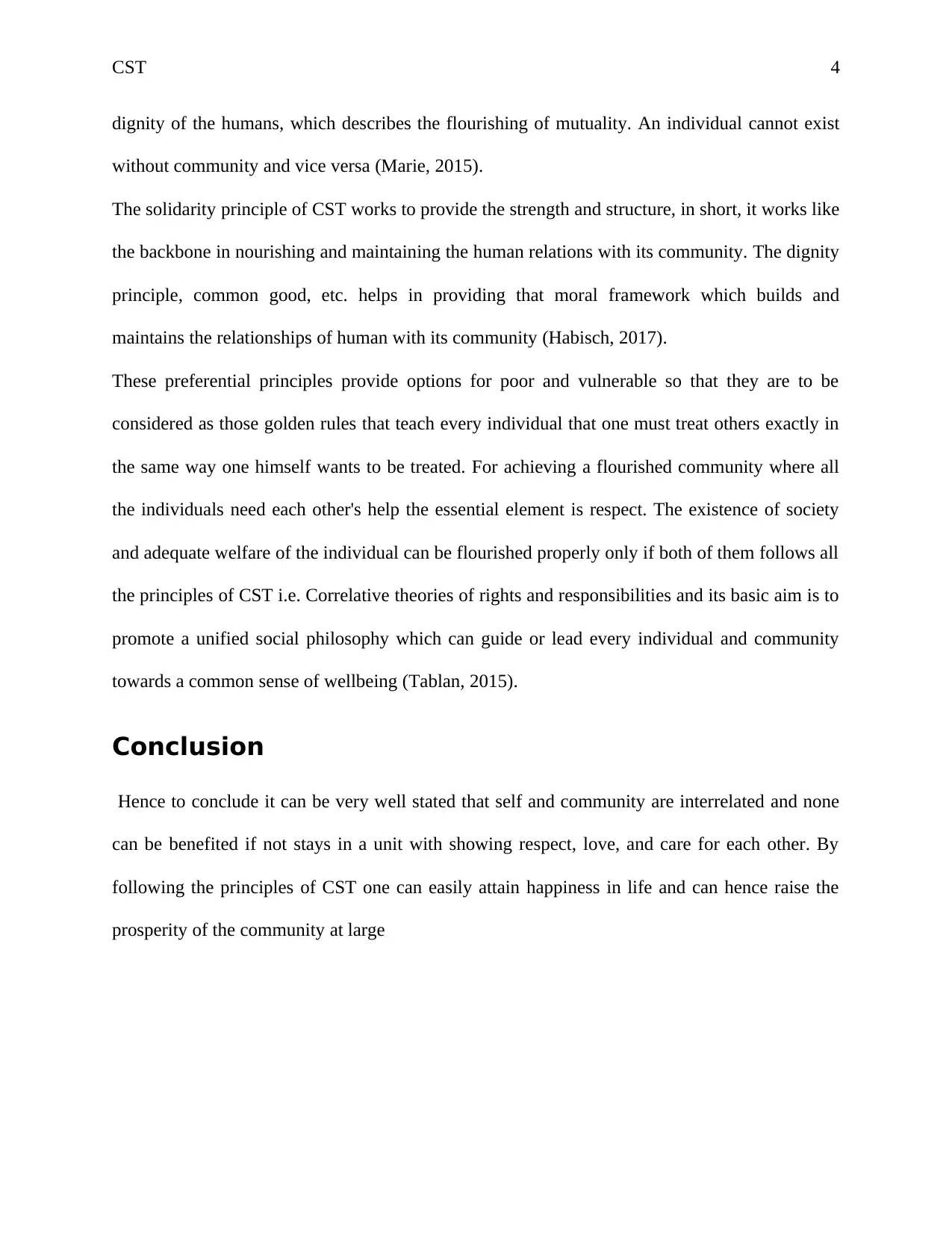
CST 4
dignity of the humans, which describes the flourishing of mutuality. An individual cannot exist
without community and vice versa (Marie, 2015).
The solidarity principle of CST works to provide the strength and structure, in short, it works like
the backbone in nourishing and maintaining the human relations with its community. The dignity
principle, common good, etc. helps in providing that moral framework which builds and
maintains the relationships of human with its community (Habisch, 2017).
These preferential principles provide options for poor and vulnerable so that they are to be
considered as those golden rules that teach every individual that one must treat others exactly in
the same way one himself wants to be treated. For achieving a flourished community where all
the individuals need each other's help the essential element is respect. The existence of society
and adequate welfare of the individual can be flourished properly only if both of them follows all
the principles of CST i.e. Correlative theories of rights and responsibilities and its basic aim is to
promote a unified social philosophy which can guide or lead every individual and community
towards a common sense of wellbeing (Tablan, 2015).
Conclusion
Hence to conclude it can be very well stated that self and community are interrelated and none
can be benefited if not stays in a unit with showing respect, love, and care for each other. By
following the principles of CST one can easily attain happiness in life and can hence raise the
prosperity of the community at large
dignity of the humans, which describes the flourishing of mutuality. An individual cannot exist
without community and vice versa (Marie, 2015).
The solidarity principle of CST works to provide the strength and structure, in short, it works like
the backbone in nourishing and maintaining the human relations with its community. The dignity
principle, common good, etc. helps in providing that moral framework which builds and
maintains the relationships of human with its community (Habisch, 2017).
These preferential principles provide options for poor and vulnerable so that they are to be
considered as those golden rules that teach every individual that one must treat others exactly in
the same way one himself wants to be treated. For achieving a flourished community where all
the individuals need each other's help the essential element is respect. The existence of society
and adequate welfare of the individual can be flourished properly only if both of them follows all
the principles of CST i.e. Correlative theories of rights and responsibilities and its basic aim is to
promote a unified social philosophy which can guide or lead every individual and community
towards a common sense of wellbeing (Tablan, 2015).
Conclusion
Hence to conclude it can be very well stated that self and community are interrelated and none
can be benefited if not stays in a unit with showing respect, love, and care for each other. By
following the principles of CST one can easily attain happiness in life and can hence raise the
prosperity of the community at large
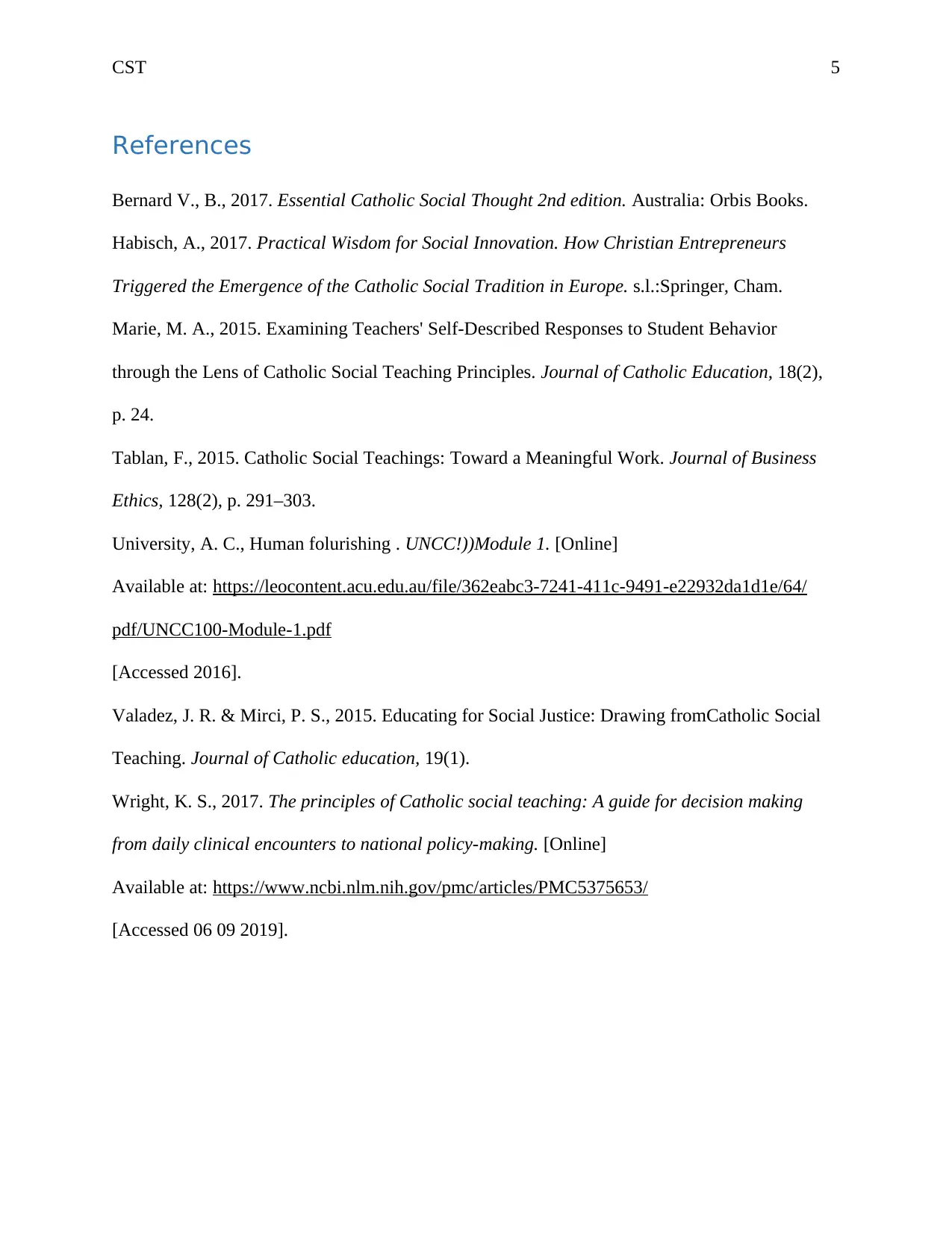
CST 5
References
Bernard V., B., 2017. Essential Catholic Social Thought 2nd edition. Australia: Orbis Books.
Habisch, A., 2017. Practical Wisdom for Social Innovation. How Christian Entrepreneurs
Triggered the Emergence of the Catholic Social Tradition in Europe. s.l.:Springer, Cham.
Marie, M. A., 2015. Examining Teachers' Self-Described Responses to Student Behavior
through the Lens of Catholic Social Teaching Principles. Journal of Catholic Education, 18(2),
p. 24.
Tablan, F., 2015. Catholic Social Teachings: Toward a Meaningful Work. Journal of Business
Ethics, 128(2), p. 291–303.
University, A. C., Human folurishing . UNCC!))Module 1. [Online]
Available at: https://leocontent.acu.edu.au/file/362eabc3-7241-411c-9491-e22932da1d1e/64/
pdf/UNCC100-Module-1.pdf
[Accessed 2016].
Valadez, J. R. & Mirci, P. S., 2015. Educating for Social Justice: Drawing fromCatholic Social
Teaching. Journal of Catholic education, 19(1).
Wright, K. S., 2017. The principles of Catholic social teaching: A guide for decision making
from daily clinical encounters to national policy-making. [Online]
Available at: https://www.ncbi.nlm.nih.gov/pmc/articles/PMC5375653/
[Accessed 06 09 2019].
References
Bernard V., B., 2017. Essential Catholic Social Thought 2nd edition. Australia: Orbis Books.
Habisch, A., 2017. Practical Wisdom for Social Innovation. How Christian Entrepreneurs
Triggered the Emergence of the Catholic Social Tradition in Europe. s.l.:Springer, Cham.
Marie, M. A., 2015. Examining Teachers' Self-Described Responses to Student Behavior
through the Lens of Catholic Social Teaching Principles. Journal of Catholic Education, 18(2),
p. 24.
Tablan, F., 2015. Catholic Social Teachings: Toward a Meaningful Work. Journal of Business
Ethics, 128(2), p. 291–303.
University, A. C., Human folurishing . UNCC!))Module 1. [Online]
Available at: https://leocontent.acu.edu.au/file/362eabc3-7241-411c-9491-e22932da1d1e/64/
pdf/UNCC100-Module-1.pdf
[Accessed 2016].
Valadez, J. R. & Mirci, P. S., 2015. Educating for Social Justice: Drawing fromCatholic Social
Teaching. Journal of Catholic education, 19(1).
Wright, K. S., 2017. The principles of Catholic social teaching: A guide for decision making
from daily clinical encounters to national policy-making. [Online]
Available at: https://www.ncbi.nlm.nih.gov/pmc/articles/PMC5375653/
[Accessed 06 09 2019].
⊘ This is a preview!⊘
Do you want full access?
Subscribe today to unlock all pages.

Trusted by 1+ million students worldwide
1 out of 6
Related Documents
Your All-in-One AI-Powered Toolkit for Academic Success.
+13062052269
info@desklib.com
Available 24*7 on WhatsApp / Email
![[object Object]](/_next/static/media/star-bottom.7253800d.svg)
Unlock your academic potential
Copyright © 2020–2026 A2Z Services. All Rights Reserved. Developed and managed by ZUCOL.




